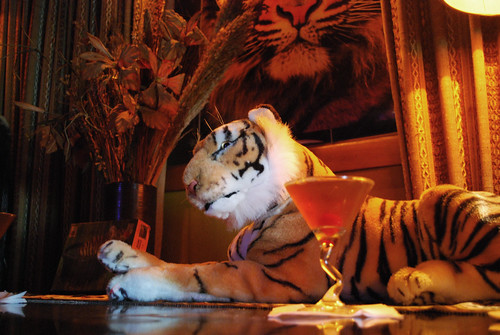Lately, however, I've been greatly enjoying a less-celebrated bywater of Wodehouse's work: the stories told by Mr. Mulliner at his club, the Angler's Rest. Comprising collections of stories--Meet Mr Mulliner (1927), Mr Mulliner Speaking (1929), and Mulliner Nights (1933)--plus a handful of additional stories scattered across other volumes, they all feature a protagonist from Mr. Mulliner's seemingly endless stock of young relatives. As the Wikipedia entry for Mr. Mulliner explains, they
are mainly about love lost and found; about fortunes made and failed; and about opportunities sought and missed.In other words, they are typical Wodehouse stories.
What sets them apart is primarily the simple but effective frame in which they are set: Mr. Mulliner is at the Angler's Rest, where his fellow patrons--identified solely, and ingeniously, by their libation of choice--are chewing over some topic of love, adventure, or contemporary life. After listening for a bit, he takes up the topic on offer and, Ancient-Marinering any opposition, relates an apposite story, rich with Wodehousian complications and comedy. Mulliner's stories are the draw, but the process of getting there is half the fun. Take this late evening scene, which opens "The Reverent Wooing of Archibald":
The conversation in the bar-parlour of the Angler's Rest, which always tends to get deepish towards closing-time, had turned to the subject of the Modern Girl; and a Gin-and-Ginger-Ale sitting in the corner by the window remarked that it was strange how types die out.Or this, from "Unpleasantness at Bludleigh Court," which opens with "the poet who was spending the summer at the Angler's Rest" going green at the sight of some dead rabbits in the hands of a hunter:
"I can remember the days," said the Gin-and-Ginger-Ale, "when every other girl you met stood about six feet two in her dancing-shoes, and had as many curves as a Scenic Railway. Now they are all five foot nothing and you can't see them sideways. Why is this?"
The Draught Stout shook his head.
"Nobody can say. It's the same with dogs. One moment the world is full of pugs as far as the eye can reach; the next, not a pug in sight, only Pekes and Alsations. Odd!"
Mr Mulliner regarded him sympathetically over his hot Scotch and lemon.Or, what may be my favorite Angler's Rest discussion, this one that opens "Came the Dawn":
"You appear upset," he said.
"A little," admitted the poet. "A momentary malaise. It may be a purely personal prejudice, but I confess to preferring rabbits with rather more of their contents inside them."
"Many sensitive souls in your line of business hold similar views," Mr Mulliner assured him. "My niece Charlotte did."
"It is my temperament," said the poet. "I dislike all dead things--particularly when, as in the case of the above rabbits, they have so obviously, so--shall I say?--blatantly mad the Great Change."
The man in the corner took a sip of stout-and-mild, and proceeded to point the moral of the story which he told us.Even given Wodehouse's deliberate absurdity, there's something about the slow-moving, gently tipsy conversation of the Angler's Rest that speaks to what we go to bars for: to remove ourselves briefly from the world of our everyday cares into an agreeable other place, where you never know who might pop in with an amusing story in which everything works out okay in the end. Which, come to think of it, is the reason we visit Wodehouse's world, too.
"Yes, gentlemen," he said, "Shakespeare was right. There a divinity that shapes our ends, rough-hew them how we will."
We nodded. He had been speaking of favourite dog of his which, entered recently by some error in a local cat show, had taken first price in the class for short-haired tortoiseshells; and we all thought the quotation well-chosen and apposite.

